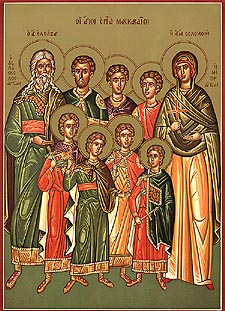|
|||
|---|---|---|---|
| This weekly bulletin insert complements the curriculum published by the Department of Christian Education of the Orthodox Church in America. This and many other Christian Education resources are available at http://dce.oca.org. | |||

The Church honors a group of martyrs who belonged to a Jewish family known as the Maccabees. Their extraordinary mother was Solomonia; sometimes her name is given as Salome. The history of the Maccabees begins with the death of Alexander the Great in 323 BC. He had been astoundingly successful in conquering many lands, including Judea and the rest of Palestine. But confusion ensued when he died, and his followers and generals struggled to find a clear course of action for the future. Judea's future—how and by whom it would be ruled—was uncertain.. By the year 300, Judea was firmly under the control of the Ptolemies of Egypt. When Antiochus III defeated the Egyptians he brought the Palestinian Jews into the Seleucid Empire. Two Biblical books relating the history of the Maccabees (known as I and II Maccabees) describe the Jews' revolt against Seleucid emperors such as Antiochus IV. Antiochus was a dedicated Hellenizer, intending to bring everything in his empire in line with Greek culture and practice. Even possessing a written copy of the Jewish Law was an offense punishable by death, and his soldiers periodically inspected Jewish homes to find lawbreakers. In Jerusalem, Antiochus pillaged the treasures of the Temple and erected a statue to the pagan gods on the Great Altar of Burnt Sacrifice. On a day of festival for the deity Dionysius, the Jews were forced to wear wreaths of ivy and walk in a procession honoring the god. An elderly and respected priest named Eleazar refused to eat the pork that soldiers forced into his mouth, because Jewish law prohibits it. Spitting out the meat, he said, "I will show myself worthy of my old age and leave to the young a noble example of how to die a good death willingly and nobly for the revered and holy laws" (II Macc. 6: 27-28). He was tortured and killed. Inspired by his example, Solomonia's seven boys also refused to break the law and consume pork, even under torture. In one single day she had to watch as all of her sons were executed.
She encouraged them with words foretelling the universal resurrection that Saint Paul would describe years later. She said, "It was not I who gave you life and breath, not I who set in order the elements within each of you. Therefore the Creator of the world, who shaped the beginnings of humankind and devised the origin of all things, will in his mercy give life and breath back to you again, since you now forget yourselves for the sake of his laws" (II Macc. 7: 22-23). In I Corinthians Saint Paul offers the same certainty Solomonia offered to her sons: "For all things are yours, whether Paul or Apollos or Cephas or the world or life or death or the present or the future—all belong to you, and you belong to Christ, and Christ belongs to God" (3: 21b-23). |
|||
